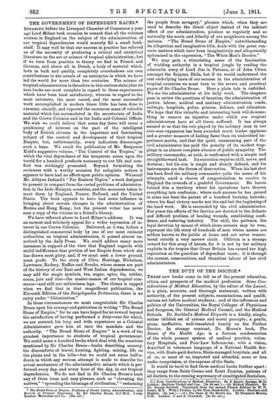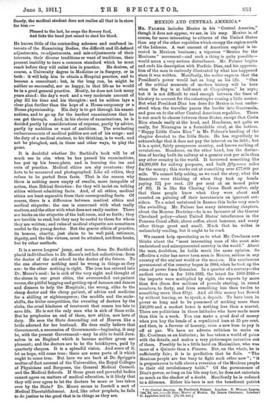THE DUTY OF THE DOCTOR.*
THREE new books come to tell us of the present educations ethics, and prospects of the medical profession. Some Con-. siderations of Medical Education, by the editor of the Lancet, is a plain, accurate, and thorough statement, written with authority, of the present subjects, examinations, and qualifi- cations set before medical students ; and of the influences and politics of the Universities, the Royal Colleges of Physicians and Surgeons, the General Medical Council, and the Medical Schools. Dr. Surbled's Medical Etiquette is a kindly, simple, rather childish set of axioms and moral precepts ; a gentle, pious, ineffective, well-translated homily on the Perfect Doctor. In strange contrast, Dr. Moore's book, The Dawn of the Health Age, is a furious condemnation of the whole present system of medical practice, volun- tary Hospitals, and Poor-Law Infirmaries ; with a visions described in vehement language, of a National Health Ser.- vice, with State-paid doctors, State-managed hospitals, and all of us, or most of us, inspected and attended, more or less under compulsion, at the expense of the State.
It would be hard to find three medical books fnrther apart : they range from Saint Cosmo and Saint Damian, patrons of all doctors, to the coming supremacy of unmitigated Socialism.
(1.) Some Considerations of Medical Relueation. By S. Squire Sprigge, London BaiMere Tindall and Cox. 12s. 6d net.]—(2) Mediecd Etiquette. By Dr. George Surbled. Translated from the second French Edition by W. P.. Grant, M.B. With a Preface by Sir Dyce Duckworth. London : Sherratt an& Hughes. [68. net.]—(3.) The Dawn ef the Health Age. By Benjarain ?doom D.Sc. London: J. and A. ChurchilL Os. 6d. net.d Surely, the medical student does not realise all that is in store for him—
Pleased to the last, he crops the flowery food,
And licks the hand just raised to shed his blood.
He knows little of the contending schemes and confused in- terests of the Examining Bodies, the difficult and ill-defined adjustments, re-adjustments, and mis-adjustments of their interests, their diverse traditions or want of traditions, their present inability to have a common standard which he must reach before they will enlist him in practice. He desires, of course, a University degree in Medicine or in Surgery, or in both : it will help him to obtain a Hospital practice, and to become a consultant : but, in the long run, he might be neither so successful, nor so happy, in that life as he would be in a good general practice. Mostly, he does not look many years ahead : the day's work and a very moderate amount of play fill his time and his thoughts : and he seldom lays a clear plan further than the hope of a House-surgeoncy or a House-physicianship. His duty is to get through his exami- nations, and to go up for the hardest examinations that he can get through. And, in his choice of examinations, he is decided partly by considerations of expense, partly by advice, partly by ambition or want of ambition. The everlasting embarrassments of medical politics are out of his range : and the duty of a medical student, to his thinking, is to work, and not be ploughed, and, in these and other ways, to play the game.
It is doubtful whether Dr. Surbled's book will be of much use to aim when he has passed his examinations, has put up his brass-plate, and is learning the ins and outs of practice. Medical ethics are shy creatures : they hate to be measured and photographed. Like all ethics, they refuse to be parted from facts. That is the reason why there is nothing more empty of results, more incapable of action, than Ethical Societies : for they will insist on talking ethics without admitting facts. And, of all ethics, medical ethics are least separable from their corresponding facts. Of course, there is a difference between medical ethics and medical etiquette : the one is concerned with what really matters,and the other with what does not really matter. There are books on the etiquette of the ball-room, and so forth ; they are terrible to read, but they may be useful to those for whom they are written; and rules of medical etiquette are sometimes useful to the young doctor. But the graver ethics of practice, its honour, charity, just claim to be well paid, reticence, dignity, and the like virtues, must be attained, not from books, but by other methods.
It is a seven leagues' jump, and more, from Dr. Surbled's placid individualism to Dr. Moore's red-hot collectivism: from the doctor of the old school to the doctor of the future. To the one observer nothing need be wrong in things as they are : to the other nothing is right. The iron has entered into Dr. Moore's soul : he is sick of the very sight and thought of the slums in our great cities, the overcrowded out-patient rooms, the pitiful begging and getting-up of bazaars and dances and dinners to help the Hospitals ; the wrong, alike to the cheap doctor and the cheap patient, of advice and medicine for a shilling or eighteenpence ; the muddle and the make- shifts, the bitter competition, the sweating of doctors by the clubs, the cruel kindness of treatment that comes too late to save life. He is not the only man who is sick of these evils. But he prophesies an end of them, new ethics, new laws of duty. He sees the State descending out of Heaven like a bride adorned for her husband. He does really believe that Government, a succession of Governments—beginning, it may be, with the present Government—may be able to build Jeru- salem in an England which is become neither green nor pleasant; and the doctors are to be the bricklayers, paid by quarterly cheques. It is a splendid vision. And some of it, let us hope, will come true : there are some parts of it which ought to come true. But here we are back at Dr. Sprigge's matter-of-fact account of the Universities, the Royal Colleges of Physicians and Surgeons, the General Medical Council, and the Medical Schools. If these great and powerful bodies cannot agree on matters of medical education, is it likely that they will ever agree to let the doctors be more or less taken over by the State ? Dr. Moore seems to foretell a sort of Medical Disestablishment. And, like other prophets, he fails to do justice to the good that is in things as they are.







































 Previous page
Previous page